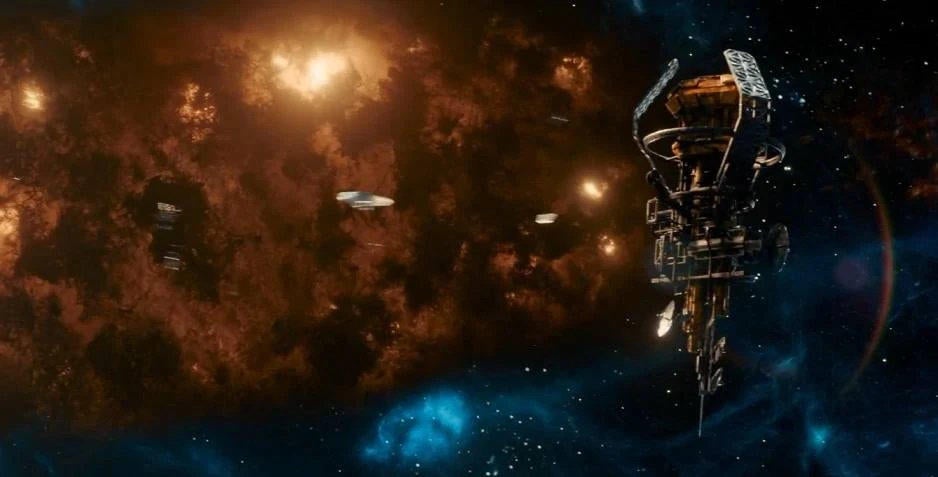Doctor Who: What Is the Flux?
Doctor Who Special Two wrestles with the destructive events of Doctor Who: The Flux.
Doctor Who Special Two: "Wild Blue Yonder" debuted on Saturday and is easily one of the strangest Doctor Who episodes in recent memory, involving a ship stuck at the edge of the universe and form-stealing alien beings from beyond. One of the Doctor's conversations with one of those aliens brought up something called "the Flux," a concept that weighs heavily on the Doctor. However, Doctor Who fans who missed the most recent season of Doctor Who may not be familiar with the Flux. It's easy enough to gather the essentials about the Flux through the context clues in the special's dialogue, but if you want more background on the Flux, we're here to help.
Showrunner Russell T Davies did warn fans that "Wild Blue Yonder" would touch on the previous era of Doctor Who, saying "The history of The Flux and The Timeless Child is dealt with very slightly in this episode." If that didn't get you to go back to watch or rewatch Doctor Who Season 13, also called Doctor Who: Flux, then here's what you missed about the Flux:

What is the Flux in Doctor Who?
Doctor Who: Flux was an unusual season of Doctor Who because it was the first season of the show since The Trial of a Time Lord (Season 23 of the original Doctor Who series) to tell a serialized story throughout. That overarching plot stemmed from the previous season's "Timeless Child" plot, revealing that the Doctor isn't native to Gallifrey but from someplace unknown. They are also not one of the Time Lords but the origin of their regenerative ability. Doctor Who: Flux begins with the release of the Flux itself, a destructive mass that uses anti-matter to destroy entire regions of space. It's compared to a galactic hurricane in the show but is more like a weapon of universal destruction.
The Doctor eventually learns that the Division, the Time Lords' shadow organization that the Doctor worked for in their forgotten lives, created and activated the Flux. Their reasons were two-fold. As explained by Tecteun, the Doctor's adoptive mother who leads the Division, they'd discovered another universe and planned to abandon their native one, believing it a lost cause, for a fresh start in the new one. The Flux would destroy the entire previous universe, ensuring that the Doctor wouldn't hound the Division. Additionally, the Flux would provide the momentum needed to send the Division's base into the second universe.
The Flux is released in waves. The first Flux event wiped out entire galaxies. With the help of sympathetic Division agents, the Doctor slows the second Flux event and eventually stops it, releasing its destructive potential on the amassed Cyber-Fleet, Dalek War Fleet, and Sontaran Empire fleet. However, it destroys more of the galaxy before the Doctor can end the threat.
The lasting consequences of the Flux remain ill-defined. After quelling the Flux's immediate threat, the Doctor believed they could somehow "decompress" the Flux. In theory, this would reverse the Flux's effects. However, the Dalek Executioner who comes for the Doctor in the holiday episode "Eve of the Daleks" states that the Doctor is responsible for "the destruction of millions of Daleks" in the Dalek War Fleet. In "Wild Blue Yonder," the Doctor laments that the Flux destroyed "half the universe." Both episodes suggest that the Doctor either didn't or couldn't go through with the "decompression" theory to reverse its effects, but the details are still vague.
What does the Flux mean for Doctor Who going forward?
While the Flux is a relatively new concept, seeing the Doctor wrestle with past regrets should be familiar to anyone who watched David Tennant's original Doctor Who run. During that time, the Doctor wrestled with guilt over the drastic measures he enacted to end the Time War, releasing a weapon called the Moment, which wiped both the Daleks and the Time Lords from the universe.
The Flux is weighing similarly on the Doctor now, but there are differences. The Doctor's experience during the Time War left him with PTSD, but it's important to note that, in the case of the Moment, he was wielding the weapon. With the Flux, the Doctor was the weapon's target. What he's dealing with now is a combination of a survivor's guilt, as he's asking himself whether his life was worth all of that destruction, and a breakdown of identity due to the revelation that he is not from Gallifrey (something Jodie Whittaker's Doctor began wrestling with towards the end of her run). Whether this resolves when the Doctor regenerates again in the final Doctor Who Special, "The Giggle," or carries over into the next Doctor Who era remains to be seen.
How to Watch Doctor Who?
The Doctor Who 60th-anniversary specials are airing on three consecutive Saturdays. Each special debuts at 6:30 p.m. on the BBC in the United Kingdom and simulcasts streaming on Disney+ in international markets.
Doctor Who's third and final 60th-anniversary special, "The Giggle," debuts Saturday, December 9th on the BBC and Disney+. The Doctor Who Christmas Special will follow on Christmas Day.